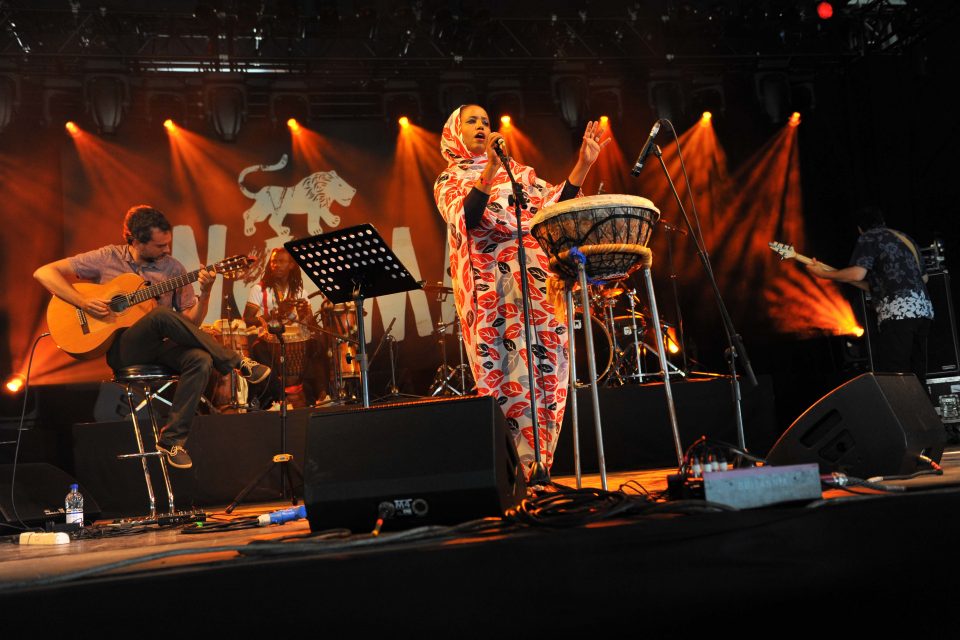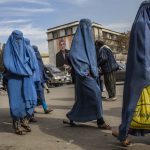Political Songs | Cuatro Proverbios – Aziza Brahim
Brahim uses her position as a musician to make the plight of the Sahrawi people known, along with that of refugees across the world who have no choice but to exist in camps.
Author:
28 February 2020

The first thing that draws you in is the little girl’s white tutu, glistening in the harsh Sahara sun. In the background are the tents and buildings of what is clearly an old, established refugee camp. The sky is a sandblasted pale blue. Her golden ballet pumps contrast with the ochre desert sand. The shadows tell you it is around midday, the ballerina’s arms are raised in an uncertain pose above her head, helping to shield her eyes from the harsh glare.
But on her face is a beautiful, beatific smile.
Our little ballerina could be a young girl anywhere in the world. But she is an exile living far from her homeland of Western Sahara.
The picture of the young ballerina was taken for the cover of an album released in November, singer Aziza Brahim’s latest offering, Sahari, her third album for Glitterbeat Records. The striking cover is up there with the best in a history that dates back to the 1930s, when album artwork was first introduced.
The job of such artwork is to attract listeners. Also, as the Symphonic music blog says, it has to incorporate the music and musicians into the sleeve.
Sahari achieves exactly that. Brahim, 43, was born in the Sahrawi refugee camp in Algeria that is shown in the photo. Her mother had fled from Moroccan forces during the war that erupted in Western Sahara and Brahim grew up in the severe conditions of that desert camp.
Hope and sorrow
A former Spanish colony, Morocco annexed Western Sahara in 1975. A war between the Polisario Front, which represents the Sahrawi people’s self-determination movement, and the Moroccans ensued and continued until 1991. The death toll is estimated at between 14 000 and 21 000 over the 43 years of conflict that ended in a ceasefire in 1991. The United Nations committed to organising a referendum of self-determination for the Sahrawis, but still has not held it.
The Sahrawi refugee situation is one of the most protracted in the world, the result of unresolved political conflict in Western Sahara. More than 125 000 Sahrawis have been living in camps near Tindouf, a city in southwest Algeria, since 1975, with little access to outside resources owing to the harsh desert conditions.
Related article:
The Sahari artwork and Brahim’s music inside that album sleeve tell you all of that in one picture, reflecting the sorrow and hope of the Sahrawi people. The refugee camp was the place that formed her. It lives in her every heartbeat.
“My purpose is to denounce the extreme living conditions there and the great injustice that prevents Sahrawi refugees from returning to their home,” Brahim said in an interview posted on her Bandcamp page. “I try to capture the feeling of longing that my elders express for the land that was taken away and for their past life in their country. But I know it’s not just us; there are currently 70 million people forcibly displaced in the world. Twenty-six million of them are refugees.”
Fascist creep
As one of North Africa’s most revered singers, Brahim uses her position to make the plight of her people known, as well as that of the refugees across the world who have no choice but to exist in camps.
Brahim is certainly worth a listen, especially as fascist creep makes its way around the world, notably in places like India, Brazil, Hungary and the United States. With this growing militarisation, there has been a militarisation of language.
Tom Hawking writes in Quartz magazine that “the militarisation of language reflects the militarisation of society; it normalises the military as a part of everyday life.”
Related article:
Language can be a tool of war, but it should be one of peace. Brahim puts it so simply, yet eloquently, in the opening track of Sahari.
The song, Cuatro Proverbios, is “about the power of peace and the total rejection of war”, she told the Pan-African Music website. The delicate song isn’t even two minutes long; it’s stripped down and features traditional percussion instruments from the artist’s desert homeland.
There are only two words: one is “war”, the other is “peace”
Those who seek war have never known it
The purpose of the dialogue is to conclude it
Never play with peace
Or to paraphrase Brahim, “those who speak war have never known it”.


